Arthur J Pais in New York
Gurinder Chadha, whose supernatural comedy, It's a Wonderful Afterlife, premiered at Sundance, one of the most popular film festivals across the globe, admits she is a sucker for emotional dramas with comic touches.

Best known for Bend it Like Beckham, Chadha, a Golden Globe nominee, is one of the most recognised of British filmmakers.
Born in Kenya, she grew up in London's Southall, the background for her many films. Her newest film focuses on a Punjabi mother (Shabana Azmi) in London who is desperate to get a husband for her big-size daughter (Goldy Notay). Trying to solve the plot is a detective, played by Sendhil Ramamurthy.
Even when she makes comedies, there is always a ton of serious thoughts in them, Chadha says. Like she told the British Broadcasting Corporation recently about her new film: 'It's about how girls are treated in the Asian community, especially when it comes to marriage and engagements and broken engagements... There's definitely a feminist line going through it as always."
The film is filled with vivid characters, including ghosts, she says, adding that while everyone enjoyed the various roles they were essaying, playing ghosts appealed very much to some.
The British TV actor Sanjeev Bhaskar plays one of the four ghosts, all murder victims and who have decided to haunt the person that killed them. Arthur J Pais finds out more.
Your films are shown at major film festivals, including the Toronto International Film Festival. And now you are in Sundance, one of the most prestigious film festivals.
I enjoy being at Sundance. This is my third film to be shown there, following Bend It Like Beckham and What's Cooking?
What do you like best being at Sundance?
The festival is not frenzied, like many others. Your film gets greater attention. Besides, you get to see fine films by independent filmmakers from all over the world.
You have described the film as a supernatural comedy. What came first?
The supernatural idea. I wanted to make a film with a wedding as a background. But that was the background for Bend It Like Beckham, and I did not want to follow that route. I thought to myself, how can I make this one different? I thought I could make something subversive (laughs).
People like supernatural films all over the world, especially in India.
True but this is a very light-hearted film but it is also full of life lessons. It doesn't go for scary effects.
'Millions have seen Sendhil in the TV series but here he looks like a movie star'
Image: A scene from It's a Wonderful AfterlifeWould you tell us about the cast?
We have artists of Indian origin from all over. Shabana Azmi from India, Sendhil Ramamurthy (TV series Heroes) from Hollywood, and Jimi Mistry from Britain.
And there are non-Asian artists from Britain, Zoe Wanamaker (Harry Potter and the Sorcerer's Stone, and a nominee for many major awards including the Tonys) and Sally Hawkins (Golden Globe winner for the film Happy-Go-Lucky), among them.
Goldy Notay, who plays the daughter in the film, was born in Canada and has acted in many [American] TV shows, including Sex and the City.
What made you choose her?
Her eyes and the smile. The glow. Goldy is a natural fit for the role. She is also very good at comedy. There is a lot of charisma in her. But most important, she brings out the emotional truth of her character.
How about Sendhil?
He looks fabulous in the movie. Of course, he is an excellent actor. Millions have seen him in the TV series but here he looks like a movie star. He has very good looks and talent too. And that is an excellent combination.
What was it like working with Shabana?
We were working for the first time. I think she enjoyed playing a comedic role. She plays a Punjabi mother, and she has a light accent. When her husband (Javed Akhtar) saw the film, he said, 'What have you done to Shabana? She looks so beautiful' (laughs).
'Making good commercial films is far more difficult'
Image: A scene from It's a Wonderful AfterlifeYou shot the film in Southall, also the background for Bend It Like Beckham.
I am fascinated with certain areas of London and, having grown up in Southall, I like to return there.
You also take a lot of care in selecting the character artists in your films.
I worked again with Shaheen Khan. She is there in all my films, starting with Bhaji on the Beach, which was made many years ago (1993). And then there is Sanjeev Bhaskar (The Kumars at No 42).
Though we were working together for the first time, I have known him for a long time. He is one of the best known actors in the United Kingdom.
Your films have had excellent run in the United Kingdom. But not all reviewers like your films.
I have had two films -- Bend It Like Beckham and Bride & Prejudice -- open back to back at number one position. Some people cannot understand how someone who is not British can do it. Some critics expect me to make films about race conflict and related issues. My films deal with social problems but I do not set out to make angry or so called art-house films.
Why is that?
I believe making the so-called art films is easier. You work on a small budget and your films have a limited audience. But making good commercial films is far more difficult. Every time I make a film, I hope people will come to see it, and I will be able to make yet another film.
'The mass-circulated newspapers have been very happy with my films'
Image: A scene from Angus, Thongs and Perfect SnoggingDo you worry about the reviews?
No. I make films for people. Besides, it is often the elitist press in Britain that thinks one ought to make films on what it thinks are burning social issues. The mass-circulated newspapers have been very happy with my films. And so are the audiences.
What do you think are the key reasons for the success of your films?
They engage the attention of the audiences. They move them, make them laugh a little, cry a little. My films reflect my attitude towards life.
And what would that be?
I do not believe seeing a glass half empty. For me, it is half full.
A few years ago you were to make a big-budget film in Hollywood, based on the TV series Dallas.
Hollywood makes films in its own mysterious ways. The project was called off after much work though we did not shoot anything. It is not uncommon in Hollywood to postpone for a long time or cancel a film project. But I have never been inactive.
Your previous film Angus, Thongs and Perfect Snogging was a big hit in the UK but it was not released here.
It was shown on Nickelodeon and was a big success. Now, it is out on the DVD. I am sure that many people, who watched it on TV and loved it, will see it on DVD and spread the word about it. It is a very British comedy but it is also a story about teenagers and people across the globe can relate to it.
'I am also far more optimistic than ever before. And this film is made in that spirit'
Image: A scene from It's a Wonderful AfterlifeYou said in an interview recently that having children have made you cautious about everything, that you are ever more careful when you cross a street.
When you are raising children, you also think of mortality and the legacy you would want to leave. You want to be a good person and set an excellent example for your children. And my latest film is made keeping those thoughts firmly in mind. I wrote it with my husband (Paul Mayeda Berges). It reflects our thoughts about the good things in life.
It's a Wonderful Afterlife is also an optimistic film...
I am also far more optimistic than ever before. And this film is made in that spirit. The title is inspired by Frank Capra's It's a Wonderful Life. I have always loved his films because they give us a reason for hope.
What can films such as It's a Wonderful Afterlife give us in troubled times...
There have always been troubled times, and cataclysmic events. But the arts, including books, have given us the courage and the hope to face problems. In difficult times, literature, music, theatre and films can make us come together and bind us. We celebrate life amidst chaos and bad events.

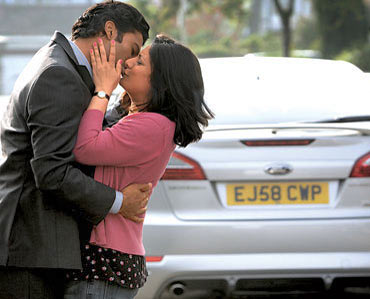
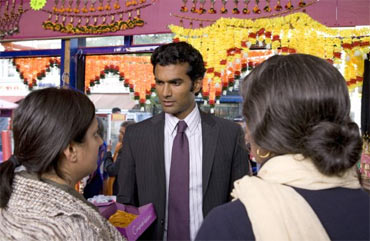
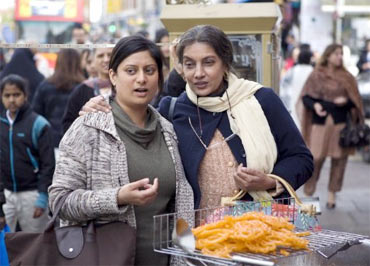
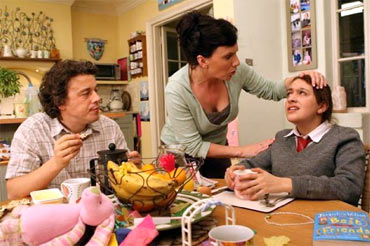
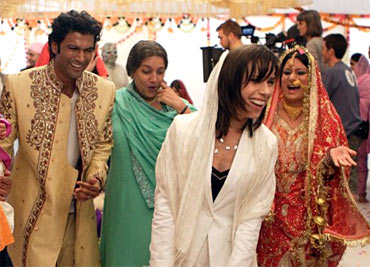
Comment
article